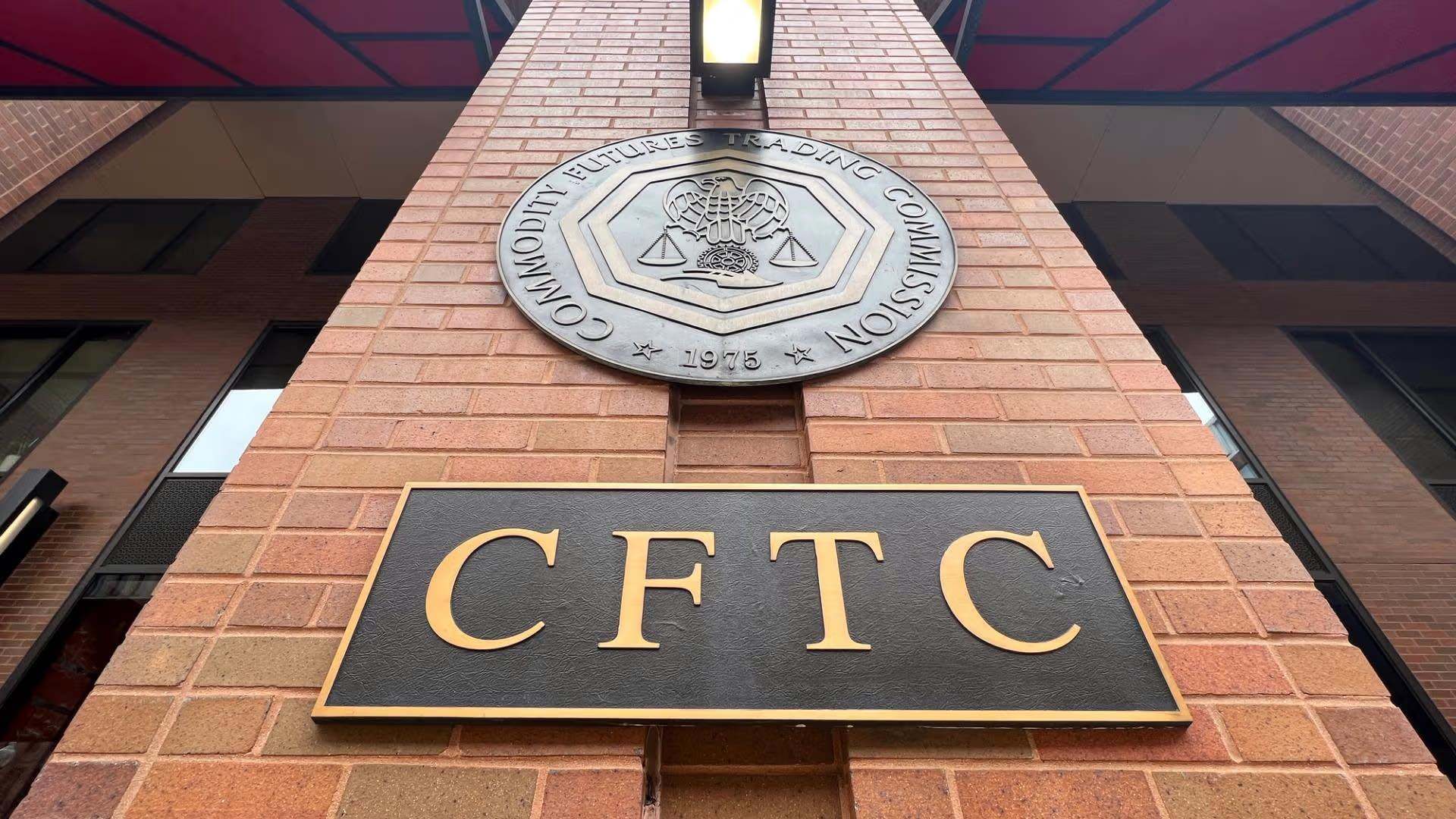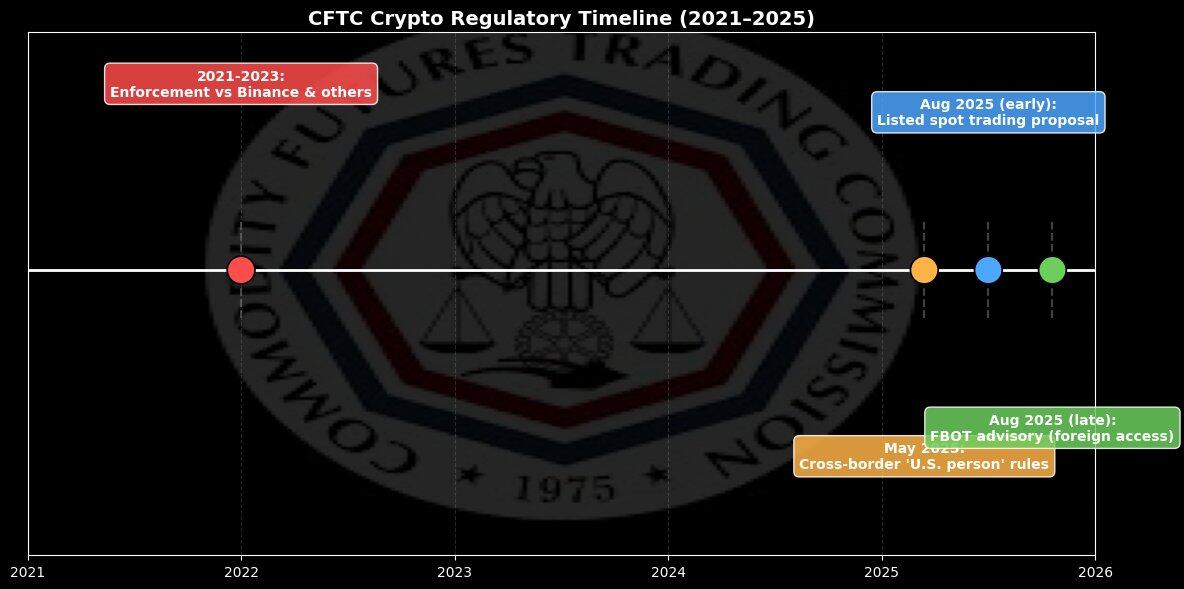A quick look at the new CFTC regulations: How can foreign exchanges legally enter the US? What businesses will benefit? What should you watch in the short term?
- 核心观点:CFTC为海外交易所提供美国合规准入。
- 关键要素:
- 合规交易所可注册FBOT服务美国用户。
- 需通过美国经纪商接入,禁止未注册平台。
- 提升市场流动性,减少VPN等风险操作。
- 市场影响:增强流动性,促进行业合规竞争。
- 时效性标注:中期影响。
This article comes from: Hunt (@hunt029)
Compiled by Odaily Planet Daily ( @OdailyChina ); Translated by Azuma ( @azuma_eth )

Editor's Note: Early this morning, the U.S. Commodity Futures Trading Commission (CFTC) officially released a guidance to clarify its registration rules for foreign trading platforms (FBOTs), providing a legal registration path for non-U.S. trading platforms and allowing U.S. users to trade on such platforms.
The clarification of this rule will undoubtedly bring about significant changes to the way US cryptocurrency users trade and the competitive landscape of the entire exchange market. This morning, cryptocurrency analyst Hunt (@hunt029) published a brief analysis of the new rules. What do they mean? What are the restrictions? Which businesses will benefit? What changes should we pay attention to in the short term?
The following is the full text of the CFTC announcement and Hunt’s analysis and interpretation, compiled by Odaily Planet Daily.

Full CFTC Announcement
The U.S. Commodity Futures Trading Commission (CFTC) Division of Market Regulation today issued a consultation on a new registration framework for foreign trading exchanges (FBOTs). This framework applies to all non-U.S. entities lawfully organized and operating outside the United States that seek to provide direct market access to U.S.-based users. The CFTC's FBOT registration framework applies to all markets, regardless of asset class, encompassing both traditional and digital asset markets.
CFTC Acting Chairwoman Caroline D. Pham stated:
“ Today’s FBOT advisory opinion provides the regulatory clarity needed to allow trading activities previously forced out of the U.S. by the ‘enforce as regulate’ approach to return legally to the U.S. By reaffirming the CFTC’s consistent approach – providing U.S. traders with choice and access to the deepest, most liquid global markets across a wide range of products and asset classes – U.S. firms previously forced to establish operations overseas to support crypto-asset trading now have a path back to the U.S. market.
As I've stated before, the CFTC's existing registration categories offer the simplest and quickest solution. Since the 1990s, Americans have been able to trade on non-US exchanges registered as FBOTs. From now on, the CFTC welcomes Americans who wish to trade efficiently and securely under CFTC oversight, while also opening up US markets to the world. This further demonstrates the CFTC's continued support for President Trump's 'crypto sprint' initiative.
As the global derivatives market continues to evolve, with new products, asset classes, and trading platforms emerging both in the United States and abroad, the CFTC’s Division of Market Regulation has received increasing inquiries regarding when FBOT registration is required and the specific requirements and process for obtaining FBOT registration.
In addition, recent enforcement actions by the CFTC based on new interpretations that are inconsistent with decades of practice have caused confusion and disruption regarding whether non-U.S. exchanges should register as designated contract markets (DCMs) or FBOTs.
By reaffirming the CFTC's long-standing FBOT registration framework, this consultation aims to promote regulatory clarity and market access.
Analysis and Interpretation
Today’s announcement by the U.S. Commodity Futures Trading Commission (CFTC) will allow Americans to legally trade on certain “offshore” crypto exchanges in a simpler way.
What does this mean, why does it matter, and how might it reshape the market?
Until now, US users often used VPNs or other methods to trade on overseas platforms—a risky approach. Now, if an overseas exchange registers with the CFTC as a Foreign Board of Trade (FBOT), US traders can legally access the exchange's services.
It should be clear that this is not a complete liberalization:
- ✅Only compliant and regulated exchanges are eligible.
- ✅Usually requires access through a US broker or futures company.
- ❌ Unregistered “wild” exchanges are still prohibited for US users.
Why is this important?
- First, in terms of liquidity : US funds flowing into global markets means deeper order books and smaller slippage;
- The second is the significance of legality : overseas exchanges that abide by the rules will be able to openly serve American customers;
- Then there is the need to reduce detours such as VPNs : clear rules are always better than various secret workarounds.
Currently, the total market capitalization of the cryptocurrency market is approximately $3.9 trillion, of which Bitcoin (BTC) accounts for over $2.2 trillion (56–57% market share) and Ethereum (ETH) for approximately $580 billion (14–15% market share). Both are near all-time highs. Many analysts optimistically predict that BTC could reach $150,000–225,000 by the end of the year, and ETH could exceed $7,000.
After the CFTC's new rules are disclosed, retail and institutional investors will have safer trading access channels; the scale of arbitrage and basis trading between the US and global markets is expected to further expand; and exchanges willing to comply with US regulatory rules will also find it easier to expand.
However, some things remain unchanged. Perpetual swaps (perps) trading services for retail investors must still be conducted on regulated futures exchanges (DCMs) in the United States; and suspicious offshore platforms are still within the scope of the CFTC's crackdown.
Overall, this CFTC announcement will directly benefit the following groups:
- First, overseas exchanges that can meet FBOT registration standards;
- The second is a US broker who can direct customer orders overseas;
- The third is all trading users who are sensitive to liquidity - because the new regulations mean deeper markets and better pricing.
From the perspective of the macro-regulatory environment and industry development, the working model of various US regulatory agencies is shifting from "relying solely on law enforcement supervision" to "rules-based market access." This is a structural positive for the adoption, liquidity, and mainstream recognition of cryptocurrencies.
From the perspective of the competitive landscape of exchanges, domestic US exchanges may have the upper hand due to their existing infrastructure and regulatory experience. However, if overseas FBOTs quickly register and provide competitive liquidity, they may also pose a challenge. Whoever prioritizes entering the US market through compliant registration may win the competition.
In the short term, the market may need to pay attention to the following three developments.
- Which exchanges will be the first to register as FBOT ?
- The CFTC's next move: whether to allow US futures exchanges to host spot crypto trading .
- Will the SEC try to intervene in this area ?
In short, the CFTC’s move opens a two-way channel for Americans and overseas exchanges, allowing U.S. users to access the liquidity of the global crypto market in a compliant manner - provided that the trading platform is willing to fulfill various compliance requirements.
The current total size of the cryptocurrency market is approaching $4 trillion. As BTC and ETH continue to rise, CFTC regulation clarity could further fuel market growth.



